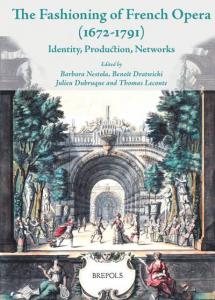 edited by Barbara Nestola, Benoît Dratwicki, Julien Dubruque, Thomas Leconte
edited by Barbara Nestola, Benoît Dratwicki, Julien Dubruque, Thomas Leconte
Collection « Épitome Musical », Brepols Publishers
Publication Year : August 2023
As the forerunners to the Paris Opera, the Académie d’opéras (1669–1672) and the Académie royale de musique (1672–1791) inspired first historical then aesthetic research, research that appeared very steadily through the eighteenth, nineteenth, and twentieth centuries. At the beginning of the twenty-first century, researchers and performers alike began to change their perspective on the institution and its legacy, shifting away from the Académie’s image as a tool used in the propaganda machine and towards a focus on aspects of performance practice. However, despite the scale and diversity of the current body of scholarship, many facets of the Académie royale de musique remain unexplored. It was first and foremost a cultural institution, one that developed its own identity and savoir-faire, some aspects of which still need to be uncovered.
This study aims to reconsider the institution from a new angle, thanks to an interdisciplinary approach and three sustained motivations: questioning the institution’s very nature, as well as its place and status in the French academic network; highlighting practical, logistical, and material questions as yet unexplored; and reevaluating not only its interactions with other theaters in Paris, at court, and in the provinces, but also the ways its repertoire spread in general. For once, poets and composers are not the main subject. We choose to concentrate instead on those who helped the pieces to exist and to come to life: directors and administrators, performers, teachers, and craftsmen. The papers focus on their hierarchical relationships, their decision-making authority, and their respective responsibilities, in order to better understand all that the fashioning of operas entails.

